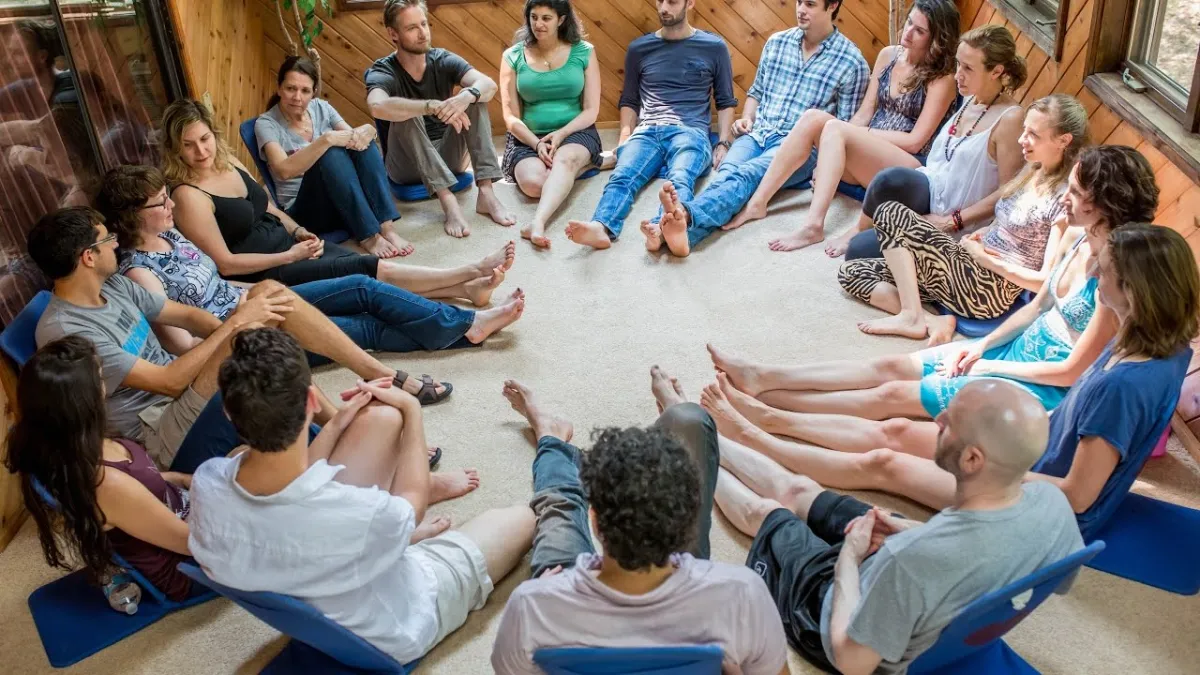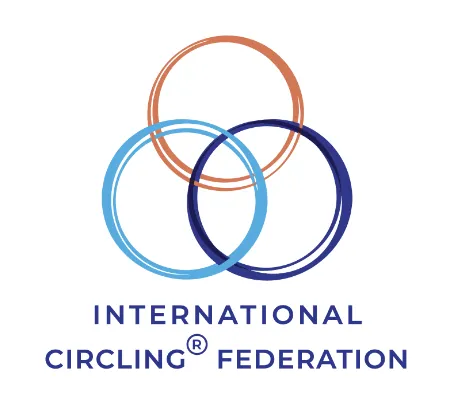Circle-jerk-ing
Mark Honeychurch - 23rd January 2024

A few days ago the NZARH, an organisation based in Auckland that I help out with, received an email from someone looking to forge connections:
_Hey there
My partner and I just arrived in new Zealand a few hours ago and by chance our bus took us by the rationalist house.
We are both circling leaders with Circling Europe and as there has been a lot of interest for circling from rationalists in Europe and USA, I wanted to check if that is also something you might be interested in here.
We have an intro tomorrow and a weekend workshop this weekend on waiheke. And we have events in wellington in February as well.
You can see our events here:
We also thought that it might be possible to set up a new event in the rationalist house when we come back to Auckland on February 13th.
Sorry for the late notice. And for being a bit forward with this. We just got excited when we saw the house.
All the best_
That’s interesting, I thought, I wonder what Circling is. My knee-jerk reaction was that this was going to be something that’s not actually rational, but I figured I’d look into it and see what it was all about.
Here’s a short 5 minute video explaining Circling:
In case, like me, things became less clear to you after watching that video, here’s my brief explanation of what Circling is:
People sit in a circle, and talk intensely and honestly about how they feel. This is an important part of the process, as restricting yourself to talking about your feelings, and not making claims about other people’s mental state or intentions, is considered by Circling to be a way of ensuring that people can only talk about things they know are true, which is supposed to help to avoid conflict and disagreement. Sessions can last for hours, and are usually guided by a facilitator. A typical Circle is either a free-for-all (which in Circling Europe can include “Surrendered Leadership”, where the leader also participates in the session), or something called a “Birthday Circle”, where everyone focuses their attention on one member of the group.
I think there are probably parallels between Circling and the Radical Honesty movement, and I can definitely imagine a Circling session being an emotionally intense event.
Of course, just because a situation brings up intense emotions, that doesn’t mean that those emotions are a true reflection of your emotional state, or that it’s useful to bring them up either. Constantly speaking out loud your swaying emotional state to a group might be fun to try for an afternoon, but I’m skeptical about the idea that it might actually have any therapeutic use.
I’ve always been skeptical about unproven therapies. It seems that when people try to diagnose their issues through these kinds of modalities, it’s just as likely to bring to the surface things that aren’t actually true as it is things that are. People can be convinced that they are feeling emotions, or making “breakthroughs”, that are just figments of their (sometimes collective) imagination. Circling’s faith in people’s feelings being a reflection of the truth seems like a misplaced trust to me.
I’ve seen these kinds of groups become very self-selective in the past. By this I mean that although a group can seem like it is fulfilling the needs of all of those who are involved, many people who try the therapy find that it doesn’t actually do anything useful for them, and so they don’t return after attending their first event. So there can be a large element of filtering, giving the illusion that this can be a life-changing process for everyone, when in reality it’s more of a clique of similarly deluded individuals.
I remember many years ago talking with a member of an evangelical church who was involved with their youth group. This person talked about how the group was going from strength to strength, and that the members were becoming more closely connected to God, with very strong spiritual and emotional bonds being made and miracles being witnessed. Later he admitted that the price of his group becoming more radical in its behaviour was that most of its members had left, finding it to be too intense for them. In this way, the group had naturally weeded out all those who weren’t comfortable going along with the group delusion. Even back then, when I was a Christian, this story left me feeling uncomfortable. Now, as an unabashed atheist, I wonder how many people were damaged by the group in the name of “seeking God”.
I’ve also met therapy junkies, those who seem to get their kicks from trying out different types of spiritual or psychological therapies - people who swear that each new therapy they try is the answer they’ve always been looking for, and that it’s making huge changes in their life. Then, once the novelty wears off, it’s on to the next new modality to try out, to chase that high. This often ends up costing them dearly (flights to India are not cheap), with the damage to their bank accounts being the only measurable difference in their lives.
Having briefly read up on Circling, and hopefully having managed to recognise it for what it is, I penned the following email response:
Jesus, Circling looks like some fucked-up kind of bullshit pseudoscientific therapy that’s one step away from Centrepoint’s Gestalt therapy and primal screaming. It’s mental masturbation for modern hippies who want to feel like they’re saving the planet while not actually having to do anything practical or useful. Plus some of their claims, like about being able to treat addiction, set off my skeptical radar. And this kind of shit just doesn’t seem rational at all:
“Participants commonly report perceptual shifts similar to mystical and druglike experiences, such as seeing facial distortions that look like other people, the room brightening in whitish-yellow light, increases in the vibrancy of sensory detail (especially visual, auditory, and somatic), a feeling of being in touch with a particular archetype such as “the jester,” “the cat,” or “the mother,” entering “timeless” and “boundless” experiences of empty presence, expanded or liberated senses of self-identity, unitive experiences with other participants, the group, and/or all of life. It’s also fairly common to see people shaking—anything from a quick little shiver up the spine to a kind of consistent shaking of the arm or leg for up to thirty seconds. Whether one considers these neurogenic tremors, energy release, or something more esoteric like Kundalini or ecstatic movement a la Shakers, the experience is consistently reported to be neutral or pleasant. These phenomena can coexist to a surprising degree with more familiar experiences.”
I’d be concerned, as a rational group, with the idea of us being connected to something like this. It’s the opposite of rationality, and their delusion that they’re rational makes it even worse. I could imagine this kind of evidence-free nonsense being damaging to many of the people who get sucked into it.
Here’s some more from the Circling Europe website About page, under the heading “What this means in practice”:
_“Trusting non-rational experience, mystical states, ceremonial rituals, and intuition as much as strategy, best business practices, and analysis”
“Including line/circle, yin/yang, masculine/feminine energies and archetypes into leadership dynamics, conversation, decision making, and strategic planning.”
“Including spiritual teachings, conversations, and practices into leadership, decision making, and relationships, such as (but not limited to:) meditation, prayer, states of awareness, nonduality, God, forgiveness and confession”_
Looks like I might have a fun topic for a future Skeptics Newsletter article!
Admittedly my first paragraph was something of a raw, unfiltered knee-jerk reaction, but I wanted to get across to my fellow NZARH council members my concern with our being involved with a group like this - and I think I managed that, at least!
Since sending my response, I’ve been looking into the claim that “there has been a lot of interest for circling from rationalists in Europe and USA”. All I can find that supports this claim are a couple of posts about Circling, posted by people who are invested in the approach, on the LessWrong website.
LessWrong is a whole new kettle of fish, and one that I’m not going to tackle in depth here. Suffice it to say that it’s a community website, run by AI enthusiasts, that is “dedicated to improving human reasoning and decision-making”. From what I can see it mainly consists of people engaged in speculative discussion - the same kind of navel-gazing nonsense that I’ve previously talked about parts of the Effective Altruism community falling into, and also the Reason and Passion group espousing. When this happens, there’s a lot of talk about future possibilities and grand ideas, but no concrete action that will make a real difference in the world - all talk and no trousers, as I’m fond of saying.
Anyway, on the LessWrong website, there’s one thread (simply titled “Circling”) that talks mumbo jumbo about tuning into someone’s nervous system:
“A good facilitator will also not force you to open up or try to get you to be vulnerable (this goes against Circling’s principles). Instead they will tune into your nervous system and try to tell when you’re feeling stressed or anxious or frozen and will probably reflect this back at you to check.”
And there’s another thread (titled “Circling as a Cousin to Rationality”), which claims that Circling:
“allows you to see the parts of your mind that activate around other people, instead of just the parts that activate when you’re sitting with yourself”
I have no doubt that these people think that they are able to tune in to other people’s nervous systems and see which parts of their mind are activating at any given time, but I’m not so sure that they haven’t just fooled themselves into thinking they have this kind of ability.
As is often the case with these kinds of systems (I’m looking at you, NLP), there’s seem to have been disagreements already - not only do we have Circling Europe, the group that are now running weekends over here in NZ, with their European Circling®, but we also have the Circling™ Institute, who are offering their Original Circling® approach, and the now-defunct Integral Circling® method from Integral Centred Leadership. Luckily, all three of these are endorsed by Circling’s founder, Guy Sengstock, and his International Circling® Federation.




There’s a lexicon, a shared language, within the group. Participants talk about “being present”, “deep truth”, “authenticity”, “the force” of being “in connection”, finding the right “distance”, and participants’ “core” and “space”. They’re convinced that they’re on a “hero’s journey”, a “journey of discovery”, revealing new insights about the human experience. It all sounds so familiar, and looks like it has the potential to go horribly wrong - as we often see with insular, intense groups like this one.
However, from what little I understand of human nature, I suspect that this won’t actually be the case - people lie, they project the parts of themselves that they want others to see, and protect those parts they don’t want to reveal. I can’t imagine things are much different for these people. Circling to me looks like a group of people who have collectively learned how to play their parts in a piece of theatre that no doubt feels profound, but that will likely ultimately leave them no better off than when they started.
I’d love to see interviews with people who are no longer active Circlers, and to find out why they no longer use the technique - I feel that story would probably be one worth telling.
When I’ve talked to ex-members of other groups, like the Baha’i faith or Quakers (and this one seems very appropriate, given their practice of sitting, leaderless, in a circle), what I’ve heard is that beneath the veneer of honesty, kindness and equality, everyone is quietly aware of what the unspoken leadership structures are, the unvoiced social rules, and the likes and dislikes that are never spoken out loud. Underneath the surface layer of pretending that things are different, better, there’s usually an undercurrent of people just being human, in all its messiness. I find it hard to imagine that Circling groups are going to be any different.
Circling kind of reminds me of Scientology in a way, as well as many of the other weird ideas that are out there. These systems of thought can feel true when you’re in them, and they can have an internal consistency that might fool many people into thinking they’re true, but unless they’re able to stand up to external scrutiny, and prove themselves to be both true and useful, it’s probably safest to stay well away from them. I think I’ll steer clear of sitting in a capitalised Circle for now, and instead stick to sitting in my familiar lower-case circle at our local Skeptics in the Pub meetings.
